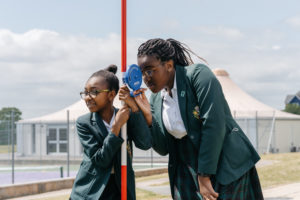Curriculum Intent

Geography at Southend High School for Girls inspires students to be curious and fascinated with the world. It enables students to understand interactions between physical and human environments to develop knowledge on place, people and resources, both nationally and globally. The subject provides a balance of human and physical geography topics throughout each Key Stage to embed and utilise the core concepts of the National Curriculum. Through a spiral curriculum, students are led to both consolidate and progress their knowledge of the world to become well-rounded learners. Through scholarly endeavour, students utilise and practise a variety of skills including numeracy, literacy, analytical and communication skills. Students are active participants in using an inquisitive approach both in the field and classroom to collate, analyse and present complex data to better understand the world we live in. Students regularly develop and practise geographical skills to interpret maps, diagrams, photographs and GIS. Students are exposed to familiar and unfamiliar environments through fieldwork in the local and surrounding area. Geography should enable students to be independent thinkers who question attitudes and alternative futures for our Earth.
What does it feel like to be a student in the Geography Department?

In years 7, 8 and 9 students are kept intrigued and challenged in developing an understanding of how physical and human environments interact, within familiar and unfamiliar places within the UK and beyond. They should develop knowledge of places, people, and interactions through named examples. Students will thrive in developing their communication skills through literacy and oracy, working on describe and explain as well as building confidence in presentation skills. They will establish research skills to independently investigate ecosystem interactions, cities and more. Students will build inquiry skills to interpret maps, diagrams and photographs.
By the end of year 11, after five years of studying Geography, students are confident in their knowledge of how physical and human environments interact. They are more informed of UK geography including the role of people and physical landscape features. Students have applied factual knowledge to local and global examples both in theory and through fieldwork. Students have developed their communication skills through literacy and oracy, working on justification and evaluation as well as being much more confident in their presentation skills. Students can interrogate a variety of media resources including photographs, maps, diagrams and GIS.
By the end of year 13, after seven years of studying Geography, students have embedded their knowledge of how physical and human environments interact through comprehensive and broad factual knowledge. They have developed independent thinking and natural curiosity about people, place, and resources, both locally, nationally and globally. Their inquisitive approach to their studies has them questioning players attitudes and alternative futures for their planet whilst thinking about sustainability and their role on the planet. Students have proven themselves to be well-rounded learners rooted in well-established skills in literacy, oracy, numeracy, analysing and evaluative in a variety of medium, for example, written work, photographs, diagrams and GIS.
Please click on the button below to download the assessment policy for Geography.
